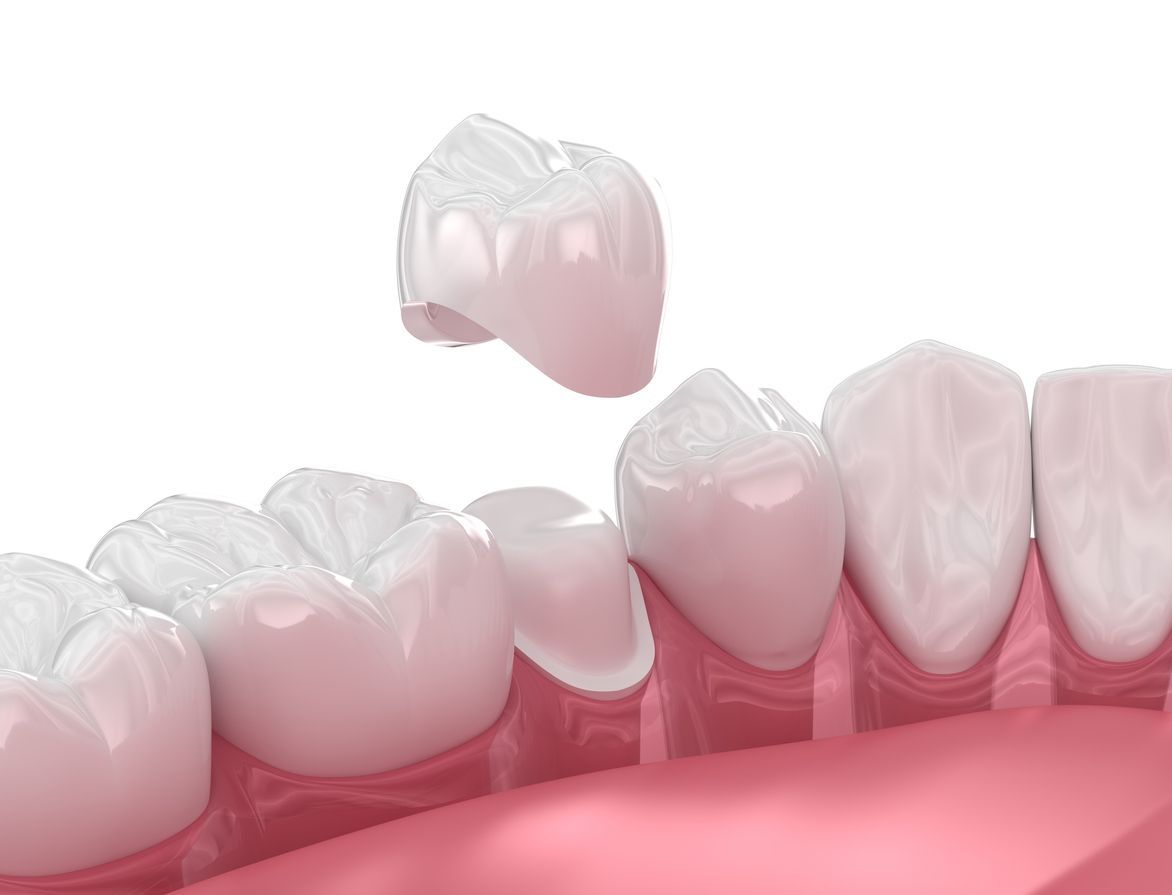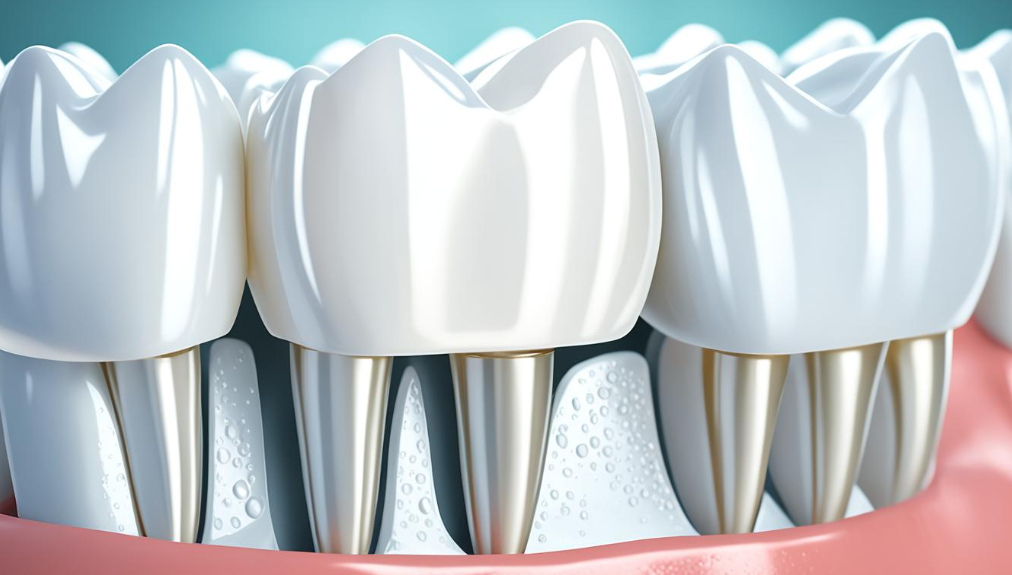Smile Designs Dental Office Blog

A temporary crown , also known as a temporary tooth cap or dental crown , is a tooth-shaped cap placed over a damaged tooth or dental implant while waiting for the permanent crown to be ready. It serves as a temporary protective cover for the tooth until the final restoration is complete. Temporary crowns are typically made from materials such as acrylic or stainless steel, which are easily moldable and can be quickly customized to fit your tooth. While not as durable as permanent crowns, temporary crowns provide essential protection and aesthetic improvement until the final crown is ready. The main difference between a temporary crown and a permanent crown lies in their longevity and durability. Temporary crowns are designed to be worn for a short period, usually a few weeks, while the permanent crown is being fabricated in a dental lab. Permanent crowns, on the other hand, are custom-made to last for many years with proper care. Do Temporary Dental Crowns Hurt? Temporary dental crowns should not cause significant discomfort or pain. However, it is normal to experience some sensitivity or mild discomfort after the placement of a temporary crown . This discomfort is usually temporary and can be managed with over-the-counter pain relievers, as recommended by your dentist. How to Care for Your Temporary Crown Proper care for your temporary crown is crucial to ensuring its stability and protecting your underlying tooth. Here are some tips: Avoid chewing hard or sticky foods on the side of your mouth with the temporary crown. Practice good oral hygiene by brushing and flossing regularly, being cautious around the temporary crown. Avoid biting your nails, chewing ice, or using your teeth as tools, as these can damage the temporary crown. If possible, try to avoid eating foods that are extremely hot or cold, as temperature extremes can cause temporary crowns to crack or break. What to Do If Your Temporary Crown Falls Off If your temporary crown falls off, it's important to contact your dentist immediately. In the meantime, you can try to carefully clean the inside of the crown and temporarily reattach it using dental adhesive or temporary dental cement available at most drugstores. However, only use these temporary solutions until you can see your dentist for proper reattachment. Remember, temporary crowns are designed to be a short-term solution, and their primary purpose is to protect your tooth until the permanent crown is ready. By following your dentist's instructions and taking proper care of your temporary crown, you can ensure the success of your dental restoration. FAQ What is a temporary crown? A temporary crown is a tooth-shaped cap that is placed over a damaged tooth or dental implant while waiting for the permanent crown to be ready. It serves as a temporary protective cover for the tooth until the final restoration is complete. Why would I need a temporary crown? A temporary crown is typically necessary if you have undergone a dental procedure that requires a permanent crown to be fabricated. For example, if you have had a root canal treatment or a dental implant placed, a temporary crown will be used to protect the treated tooth or implant until the permanent crown is ready. How long do I need to wear a temporary crown? The length of time you will need to wear a temporary crown depends on how long it takes for the dental laboratory to fabricate your permanent crown. In most cases, this takes one to two weeks. Your dentist will provide you with specific instructions on how to care for your temporary crown and when to return for the placement of the permanent crown. Can I eat normally with a temporary crown? It is generally recommended to avoid eating sticky or hard foods on the side of your mouth with the temporary crown to prevent any damage or displacement. Opt for softer foods that are easier to chew, and be mindful of the temporary crown while eating to ensure its stability. Will a temporary crown look natural? While a temporary crown is designed to provide temporary protection, it may not look as natural as a permanent crown. Temporary crowns are usually made from acrylic or composite materials, whereas permanent crowns are typically made from porcelain or porcelain fused to metal. However, your dentist will ensure that the temporary crown is shaped and shaded as closely as possible to match your natural teeth.

Are you considering replacing a missing tooth and unsure whether to choose a dental bridge or an implant? Understanding the differences between these two options is crucial for making an informed decision that aligns with your dental health goals. So, which is the better choice? Let's explore the pros and cons, costs, durability, and other factors to help you find the answer. Key Takeaways: Choosing between a dental bridge and implant requires considering factors such as durability, aesthetics, costs, dental health impact, and candidacy. Dental bridges are fixed prosthetic devices that bridge the gap created by missing teeth, while dental implants replace the root of a missing tooth and provide a more durable, long-lasting solution. Dental bridges have a lower initial cost but may require replacement or repair over time, while dental implants have a higher initial cost but offer long-term cost-effectiveness. Dental bridges rely on adjacent teeth for support, potentially compromising their long-term health, while dental implants independently preserve adjacent teeth and stimulate jawbone health. Consulting with a dentist is crucial to assessing your specific needs and choosing the best tooth replacement option for you. Understanding the Basics of Tooth Replacement Before delving into the comparison between dental bridges and implants, it is essential to understand the basics of these tooth replacement options. Dental bridges and dental implants offer effective solutions for replacing missing teeth, each with its own unique characteristics and benefits. What Are Dental Bridges? Dental bridges are fixed prosthetic devices that bridge the gap created by missing teeth. They consist of one or more artificial teeth, also known as pontics, held in place by dental crowns that are attached to the adjacent natural teeth. The pontics fill the empty space, restoring the appearance and function of the missing teeth. Dental bridges are an excellent option for individuals who have healthy natural teeth adjacent to the gap. What Is a Dental Implant? A dental implant is a titanium post surgically inserted into the jawbone to replace the root of a missing tooth. This post acts as a sturdy foundation for the placement of a dental crown, which mimics the appearance and function of a natural tooth. Dental implants are a viable option for individuals who have lost one or more teeth and want a long-term, durable solution. They also provide support to the jawbone, preventing bone loss that can occur when a tooth is missing. Evaluating the Durability of Dental Bridges vs Implants When considering a tooth replacement option, durability plays a crucial role. Understanding the longevity of dental bridges and implants is essential to making an informed decision about the best solution for your oral health needs. Longevity of Dental Bridges Dental bridges typically have a lifespan of 5 to 15 years. However, the actual durability of a bridge can vary depending on several factors, such as: Oral hygiene maintenance: Regular brushing, flossing, and routine dental check-ups are essential to keep the supporting teeth and the bridge in good condition. Health of the surrounding teeth: The success of a dental bridge relies on the health and strength of the adjacent teeth that act as anchors for the bridge. If these teeth weaken or develop issues, it may affect the lifespan of the bridge. Chewing habits: The force exerted on the bridge while chewing can impact its durability. Avoiding hard or sticky foods and adopting a balanced diet can help prolong the life of a dental bridge. Longevity of Dental Implants Dental implants, on the other hand, offer a significantly longer lifespan compared to dental bridges . With proper care and maintenance, dental implants can last for several decades or even a lifetime. The durability of dental implants is attributed to the following factors: Integration with the jawbone : Dental implants are surgically placed into the jawbone, where they fuse with the surrounding bone through a process called osseointegration. This integration provides a stable foundation for the replacement tooth, ensuring its long-term durability. Oral hygiene maintenance : Like natural teeth, dental implants require regular brushing, flossing, and dental check-ups to maintain their longevity. Overall oral health : Maintaining good oral health practices, such as avoiding smoking, practicing healthy eating habits, and addressing any oral health issues promptly, can contribute to the long-lasting success of dental implants. Overall, dental implants offer superior durability compared to dental bridges due to their ability to integrate with the jawbone. While dental bridges can provide a satisfactory solution for tooth replacement, dental implants offer a more long-term and reliable option. Comparing the Dental Bridge Vs Implant Procedures The procedures for getting dental bridges and implants differ significantly. Dental bridge placement involves preparing the adjacent teeth by removing some enamel and then creating impressions to design the bridge. The bridge is then fabricated in a dental lab and permanently cemented onto the teeth. On the other hand, dental implant placement involves surgical insertion of the implant into the jawbone, followed by a healing period during which the implant fuses with the bone. After the healing period, a crown is placed on top of the implant. The implant procedure generally requires more time and multiple visits to the dentist compared to the dental bridge procedure . The Aesthetic Outcomes: Dental Bridge Vs Implant Both dental bridges and implants can provide aesthetically pleasing outcomes. Dental bridges are designed to match the color and appearance of natural teeth, providing a seamless blend with your smile. However, the success of the aesthetic outcome relies on the quality of the dental lab work and the expertise of the dentist. Dental implants offer the most natural-looking results as the crown is individually customized to match the size, shape, and color of the surrounding teeth. The implant's integration with the jawbone also enhances facial appearance by preserving the bone structure. Considering the Costs: Dental Bridge Vs Dental Implant When deciding on a tooth replacement option, one crucial factor to consider is the cost. In this section, we will compare the costs associated with dental bridges and dental implants and discuss their long-term cost-effectiveness. Initial Cost Comparison Dental bridges generally have a lower initial cost compared to implants. Dental bridge costs vary depending on factors such as the number of missing teeth and the material used. The average cost for a dental bridge ranges from $500 to $1,200 per tooth. On the other hand, dental implant costs are typically higher due to the surgical procedure involved. The average cost of a single dental implant can range from $1,500 to $6,000. Long-Term Cost Effectiveness When evaluating the long-term cost, it is essential to consider the lifespan and maintenance of each option. Dental bridges may require replacement or repair over time, which can increase the overall cost. The durability of dental bridges typically ranges from 5 to 15 years . On the other hand, dental implants have a significantly longer lifespan , often lasting several decades or even a lifetime. With proper care and maintenance, dental implants are known for their long-term cost-effectiveness. Maintenance costs should also be considered. Dental bridges may require regular check-ups and potential repairs, which can add to the long-term cost. Dental implants, once integrated with the jawbone, require minimal maintenance beyond regular oral hygiene practices such as brushing and flossing. While dental bridges may be more affordable initially, dental implants offer a more cost-effective solution in the long run due to their longevity and minimal maintenance requirements. Assessing the Pros and Cons of Dental Bridges and Implants Pros of Dental Bridges Dental bridges offer several advantages as a tooth replacement option: Non-surgical solution : Unlike dental implants, dental bridges do not require surgery, making them a suitable choice for individuals who prefer a non-invasive procedure. Quicker completion : The process of getting dental bridges is relatively quicker compared to dental implants. It typically involves fewer visits to the dentist and a shorter treatment timeline. Initial cost : Dental bridges are generally less expensive initially, making them a more budget-friendly option for individuals who may not be able to afford the upfront cost of implants. Cons of Dental Bridges While dental bridges have their advantages, they also come with certain drawbacks: Adjacent tooth grinding : Dental bridges require the grinding down of the healthy adjacent teeth to support the bridge. This irreversible alteration can compromise the long-term health of these teeth. Potential bone loss : Over time, the absence of tooth roots in the jawbone can lead to bone loss in the area where the bridge is placed. Pros of Dental Implants Dental implants offer several benefits that make them a popular choice for tooth replacement: Durable and long-term solution : Dental implants are highly durable and have the potential to last a lifetime with proper care. They provide a reliable and long-term solution for missing teeth. Preserve adjacent teeth : Unlike dental bridges, implants do not rely on adjacent teeth for support. This preserves the natural structure and health of the neighboring teeth. Promote jawbone health : The integration of dental implants with the jawbone stimulates bone growth and prevents bone loss, preserving overall oral health and facial structure. Cons of Dental Implants Despite their numerous advantages, dental implants also have a few considerations to keep in mind: Surgical procedure : The placement of dental implants requires a surgical procedure, which may not be suitable for individuals who have certain medical conditions or prefer non-invasive treatments. Longer treatment timeline: Implants typically involve a longer treatment timeline compared to dental bridges. The process includes a healing period after implant placement to allow for osseointegration, the fusion of the implant with the jawbone. Higher initial cost : Dental implants are generally more expensive initially compared to dental bridges. However, their long-term durability can make them more cost-effective in the long run. When deciding between dental bridges and implants, it is crucial to consider these pros and cons alongside other factors such as your oral health, aesthetic goals, budget, and personal preferences. A thorough evaluation and consultation with a qualified dentist will ultimately help you determine the best tooth replacement option for your specific needs. Dental Bridge vs Implant: Dental Health Impact When considering the choice between dental bridges and implants, it is essential to understand their impact on dental health. Both options have distinct effects on adjacent teeth and jawbone health. Let's explore these impacts in detail. Effect on Adjacent Teeth Dental bridges rely on adjacent teeth for support. In order to place a bridge, the healthy adjacent teeth need to be prepared by removing some enamel. This process involves grinding down the healthy tooth structure, which can compromise their long-term health. Over time, this may lead to increased vulnerability to decay, sensitivity, and even the potential loss of these teeth. Impact on Jawbone Health Dental bridges don't have a direct impact on jawbone health. However, they do not stimulate the jawbone like natural teeth or dental implants. Without proper stimulation, the jawbone can start to deteriorate over time. This loss of jawbone density may affect facial appearance and stability, potentially leading to changes in speech and difficulty with chewing. Candidacy for Dental Bridge or Dental Implant Not everyone is a suitable candidate for dental bridges or implants. The choice between these two tooth replacement options depends on various factors, including the condition of your oral health. Your dentist will evaluate your candidacy based on several criteria: Healthy adjacent teeth : Dental bridges require the support of adjacent teeth. To be a candidate for a bridge, you must have healthy teeth on either side of the gap. Sufficient bone support : Dental bridges also rely on adequate bone density for stability. If you have a substantial amount of healthy bone, you may be a suitable candidate for a bridge. Missing teeth without suitable adjacent teeth : If you have missing teeth but lack healthy teeth on either side of the gap, dental implants may be a better alternative. Implants do not rely on adjacent teeth for support. Insufficient bone density : If you have low bone density in your jaw, dental implants may not be feasible. However, there are options available, such as bone grafting, to improve your candidacy for implants. Your dentist will take into account your oral health, conduct diagnostic tests, and review your medical history to determine the most suitable tooth replacement solution for you. It's essential to consult with a qualified dentist who can assess your specific needs and guide you towards the best option for restoring your smile. Recovery and Aftercare: Bridge vs Implant After undergoing a dental bridge procedure , it is common to experience temporary sensitivity or discomfort, which should subside shortly. To ensure the longevity of your dental bridge, it is crucial to practice good oral hygiene. Regular brushing, flossing, and dental check-ups are necessary to maintain the durability of the bridge and prevent any potential issues. On the other hand, the recovery period for dental implants is typically longer as the implant needs time to integrate with the jawbone. During this healing phase, it is important to follow any specific dietary restrictions provided by your dentist to avoid putting excessive pressure on the implant site. Proper oral hygiene, including regular brushing and flossing, is essential to ensuring the long-term success and longevity of the implant. Both dental bridges and implants require regular dental visits for check-ups and professional cleanings. Your dentist will monitor the health of your bridge or implant and provide guidance on proper aftercare techniques specific to your situation.


